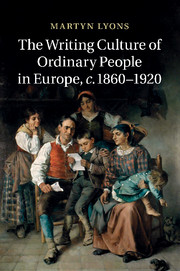Book contents
- Frontmatter
- Contents
- Illustrations
- Maps
- Acknowledgements
- Note on translations and transcriptions
- 1 Ordinary writings, extraordinary authors
- 2 Archives for an alternative history
- 3 ‘Excuse my bad writing’
- 4 Literary temptations
- 5 France
- 6 France
- 7 Family, village and motherland in the writing of Italian soldiers, 1915–1918
- 8 Italian identities ‘from below’ and ordinary writings from the Trentino
- 9 Love, death and writing on the Italian front, 1915–1918
- 10 Spain
- 11 Family strategy and individual identities in the letters of Spanish emigrants
- 12 Order and disorder in the ‘memory books’
- 13 Conclusions
- Bibliography
- Index
- References
13 - Conclusions
Published online by Cambridge University Press: 05 November 2012
- Frontmatter
- Contents
- Illustrations
- Maps
- Acknowledgements
- Note on translations and transcriptions
- 1 Ordinary writings, extraordinary authors
- 2 Archives for an alternative history
- 3 ‘Excuse my bad writing’
- 4 Literary temptations
- 5 France
- 6 France
- 7 Family, village and motherland in the writing of Italian soldiers, 1915–1918
- 8 Italian identities ‘from below’ and ordinary writings from the Trentino
- 9 Love, death and writing on the Italian front, 1915–1918
- 10 Spain
- 11 Family strategy and individual identities in the letters of Spanish emigrants
- 12 Order and disorder in the ‘memory books’
- 13 Conclusions
- Bibliography
- Index
- References
Summary
The submerged continent of ordinary writing
This study has sketched the contours of a submerged continent of ordinary writings. War and emigration produced exceptional circumstances of separation in which writing became intrinsic to the lives of ordinary people. In at least three mainly peasant societies – France, Spain and Italy – the transition to mass literacy was marked by an explosion of writings by the partly educated and semi-literate. I have qualified this explosion as ‘boulimic’; the historian of Portuguese emigration to Brazil, Henrique Rodriguez, prefers to call it ‘compulsive writing’, but we are both describing the same phenomenon. Even the most untutored writers overcame their difficulties, making a time and a space to write. They apologised profusely for their epistolary faults, but having grasped a pencil and improvised some writing materials, they appropriated the page in front of them for their own purposes. They wrote out of an urgent need to remind loved ones that they were still alive, they wrote to remember and make sense of extraordinary experiences, or they wrote simply for the pleasure of writing. They used writing to record, to communicate and to manage distant affairs of the family. They wrote to ingratiate themselves with superiors, and to construct or preserve an identity. As a few explicitly realised, writing became an inseparable part of life itself.
It no longer seems legitimate to assume that the poor and uneducated were inarticulate or that they have left few written traces of their existence with which historians can work. This fallacy nevertheless persists. As recently as 2010, one Italian historian of the modern period rashly wrote:
across a large swathe of Europe, until well into the twentieth century, epistolary emotions could only be expressed by a restricted number of people…finding documentary evidence of unremarkable people’s emotional lives is usually more difficult.
- Type
- Chapter
- Information
- The Writing Culture of Ordinary People in Europe, c.1860–1920 , pp. 245 - 256Publisher: Cambridge University PressPrint publication year: 2012



